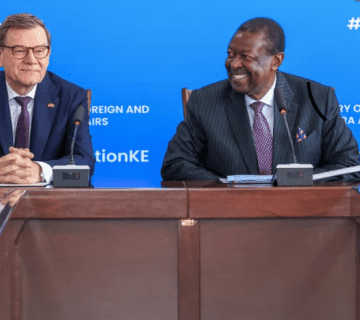In September 2020, United States Africa Command (AFRICOM) started contemplating the expansion of its drone strikes into Kenya targeting the Somali-based al Shabab group. The shift to include Kenya in America’s theatre of war on terror in East Africa ostensibly follows the January 2020 al Shabab attack on the United States military base in Lamu. The drone campaign could focus on Garissa and Lamu counties of Kenya – counties that border Somalia and have recorded higher terrorism activity over the past couple of years.
The drone campaign against al Shabab will be of mutual interest to both the United States and Kenya since the two countries have partnered in fighting terrorism in East Africa, especially in Somalia, whereupon Kenya has received an estimated USD 400 million in military assistance in the last 10 years. Kenya has been the second hardest-hit country by al Shabab attacks in the Horn of Africa after Somalia, with major attacks being the Garissa University attack in 2014 in which 247 people were killed, the Westgate Mall attack in 2013 in which 67 people were killed, and Mpeketoni attack in which about 50 were killed. Other low-scale terrorist attacks have been recorded at a higher frequency especially in Garissa, Lamu, and Mandera counties in Kenya. Al Shabab’s terrorism on the other hand remains a constant threat to Kenya’s highest foreign income earner, the tourism industry, which plummeted significantly in 2014 and is still struggling to recover. The other significant advantages Kenya might gain from the drone campaign are the surveillance and pre-emptive strike capabilities courtesy of America’s unmanned aerial military vehicles and precision strike technology.
However, America’s shift to drone warfare in counter-terrorism has drawn legitimate criticism for the collateral damage associated with drone strikes, especially the killing of innocent civilians, and the lack of accountability associated with the drone campaign. On top of such risks, Kenya will potentially encumber its counter-terrorism strategy and objectives with countervailing effects of America’s drone campaign.
The Human Rights and Accountability Specter
America’s drone campaigns in countries such as Pakistan, Afghanistan, Iraq, Yemen, Somalia, and Syria have been risky precedents. For instance, a 2010 study by New American Foundation, for instance, found that a third of the victims of US drone strikes in Pakistan between 2004 and February 2009 were innocent civilians. As the number of innocent civilians killed by the drones (which were meant to pursue al Qaida) increased, Pakistan’s parliament was forced to end the US drone program in 2012 under heavy public pressure. Besides grave human rights violations by the drone war, the US government has traditionally not demonstrated openness, transparency, and accountability with its drone warfare. UN Human Rights report in 2012 not only termed America’s drone strikes in Pakistan as indiscriminate, but also criticized America’s lack of transparency and accountability with regard to innocent civilian victims of the drone strikes.
Change of Policy
While America’s response to criticism of its drone strikes, for instance, under President Obama, was the development of stricter guidelines and standard operating procedures (SOPs) for drone attacks, the Trump administration has loosened them. As a consequence, the current US foreign drone warfare has demonstrated a dire lack of accountability. It is now easier to sanction strikes thus permitting indiscriminate attacks against civilians. Observably, drone strikes have increased under each American president since George W Bush in 2004. President Obama expanded Bush’s drone war in Pakistan and significantly increased strikes in Somalia. President Trump has similarly increased drone strikes especially in Somalia. Kenya should, therefore, shirk the proposal since the country has limited influence on American defense and security policymaking, and what may begin as a small campaign might expand beyond control in a way that can hurt the country’s national interest.
Further Radicalization and De-legitimization of Counter-Terrorism
The possible focus of American drone war in Lamu and Garissa counties, both Muslim-majority areas, and the imaginable chance of future expansion of the airstrikes into Mandera and Wajir counties which similarly experience higher terrorist activity risks playing into the narratives of terrorists. With the region still struggling against the legacy of marginalization and the tense historical State-Muslim-Somalia relations, America’s drone strikes will validate al Shabab’s narratives which cast Kenya as a collaborator of the “Western crusade” against the Muslim community. On the other hand, victimized communities are likely to rise up against continued drone strikes or offer sympathy to al Shabab as it happened in northern Pakistan where US drone strikes along the Pakistan-Afghanistan border drew more people into Taliban and al Qaida fold to exact vengeance. As a result, the level of civilian grievance and anti-American sentiment dampened the war’s credibility in Pakistan and led to pressure from the public, parliament, and the judiciary in the country, leading to the termination of the US drone campaign in Pakistan.
Violation of State Sovereignty
While the US drone strikes in Pakistan followed communications between the US military command and Pakistan’s Inter-Services Intelligence Agency, in most cases, public pressure, parliament, and even the executive branch of the government failed numerously to scale down the American drone strikes. A similar experience lurks in Iraq where the country’s parliament voted in January 2020 to expel American forces in the country, following the killing of General Qassem Soleimani, the head of Iran’s Islamic Revolutionary Guard Corps’ (IRGC’s) Quds Force, two days earlier. However, American airstrikes had been reported in March by a manned aircraft, and in September from an aircraft carrier, amid ‘9-month imminent’ US withdrawal. Observably, the US government scales down aerial strikes to mollify the host country’s public pressure, only to resume normal operations during low-public pressure moments. In essence, escalated by recent US drone war guidelines review, Kenya would technically lose the power to determine AFRICOM’s targets and frequency, control of collateral damage as well as the ability to safeguard its sovereignty when the drone war begins to work at cross-purposes.
Bottomline
Kenya should reject America’s overtures for authority to conduct drone strikes in Lamu and Garissa. Potential indiscriminate attacks on civilians and violation of the country’s sovereignty and human rights will collectively delegitimize the country’s counter-terrorism strategy and further radicalize affected communities. Resisting a possible US drone war will help the government avoid risky public pressure on its counter-terrorism strategy as well as save its historical relations with the US.
Edmond J. Pamba is a Researcher at the HORN Institute.
Photo Credit: Wikimedia Commons



